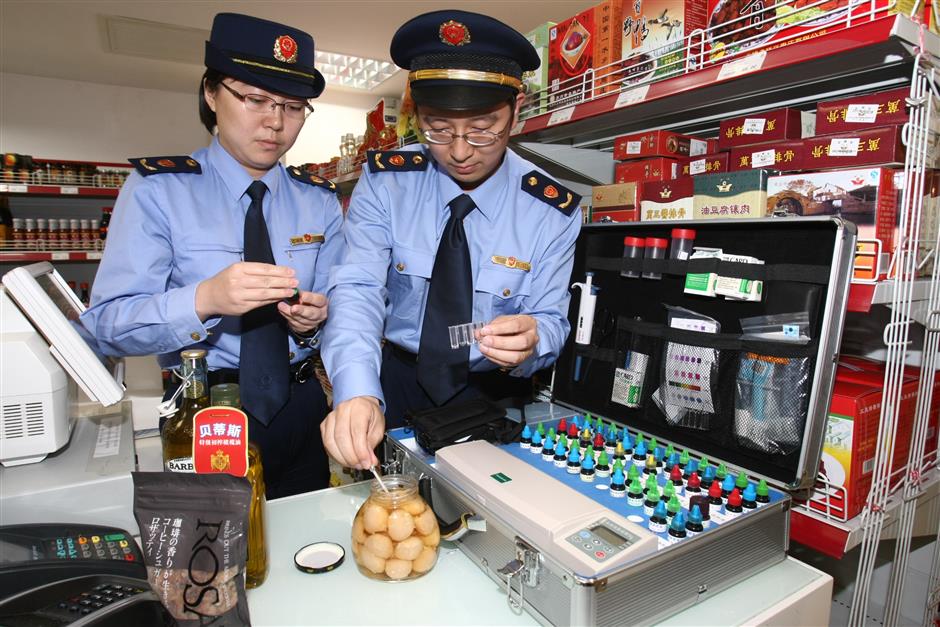A netizen army has taken the food safety fight onto the streets and social media

Officers from Shanghai Administration for Industry & Commerce and Shanghai Agricultural Commission test food quality at the Shanghai No. 1 Food Store.
The issue of food safety is a huge one in China today, and that’s been the case for at least the last decade. Because of this, China has been scrambling to keep up with a fast-changing climate and ever-changing modes of consumption. That leaves a lot of policing around food safety to the people, and with the stellar popularity of social media, they’re taking that role seriously.
At present there are at least eight government bodies who have their fingers in the pie, with no clear-cut hierarchy or mandate or clear responsibilities. The State Food and Drug Administration of China was set up in the early 2000s to help tackle concerns around food safety, but it somehow failed to climb to the top of the food chain — another pun, sorry — and set the agenda.
As you may have figured out, Chinese people are absolutely obsessed with food safety and food quality, largely due to the quickly rising number of those in the middle class, and some high-profile scandals that left those people rightly terrified. They have the means and the ability to spend their excess hard-earned money where they see fit, which has led to huge industries around the world working largely to supply what hundreds of millions of Chinese demand: safe, nutritious food.
That includes my native New Zealand, which I like to affectionately call China’s naiyuandi (milk source).
So, in the meantime, the people have stepped in, in many ways, to pick up the slack and ensure pressure remains firmly on food outlets — especially restaurants — when it comes to food safety. And the way they are doing that is by utilizing the power of social media.
Recently we found out, through Weibo and other online platforms, that a popular huoguo (hotpot) chain in Beijing was infested with mice, that a dying rat fell through the roof and landed on some food in a restaurant in Shanghai’s Yangpu District, that a Korean joint in Jing’an District served up steak with a little something extra, and that Chinese McDonald’s ice-cream machines are sparkly clean, not like some in the United States!

A woman in Dalian, Liaoning Province, uses a restaurant bowl to feed her pet dog water.
And the vigor used by netizens in their policing work is not only used against restaurants with bad practices — customers, too, are facing the wrath of the online army. A woman in Dalian in northeast China’s Liaoning Province found that out the hard way, when pictures of her feeding her dog using a bowl from a restaurant table sent her pooch to the top of the Most Hated list!
Social media is powerful enough in its own right, but it’s formidable when coupled with mainstream media. Weibo, WeChat and online forums are now fertile ground for news agencies looking to cover what is hot and what is being talked about. You may have noticed lately, if you follow Chinese media at all (I know you do!), that “evidence” from average people submitted to the big wide world of the Internet is just one of those hot topics.
Information and “evidence” first spread like wildfire within the realms of cyberspace become a raging inferno when mainstream media relentlessly add fuel to the flames.
For all the pluses of people being involved in keeping restaurants on their toes and placing scorn on them when they stuff up, help still needs to come from government, and hopefully one day that will mean China has a single body setting the agenda and improving food safety here, even though that means that inevitably my country, and many others, will need to find new industries to support themselves.
The Shanghai government is well on the way by aiming to become a “national food safety model city” by fulfilling 90 international food safety standards by early next year. This is a huge leap in the right direction, and one which should see Shanghai becoming a model for the rest of China.
Until then, you’re going to keep seeing horrible stories of food safety neglect spreading across social and mainstream media, naming and shaming those who put us at risk. It’s a little disgusting, but I think it’s truly for the greater good.















